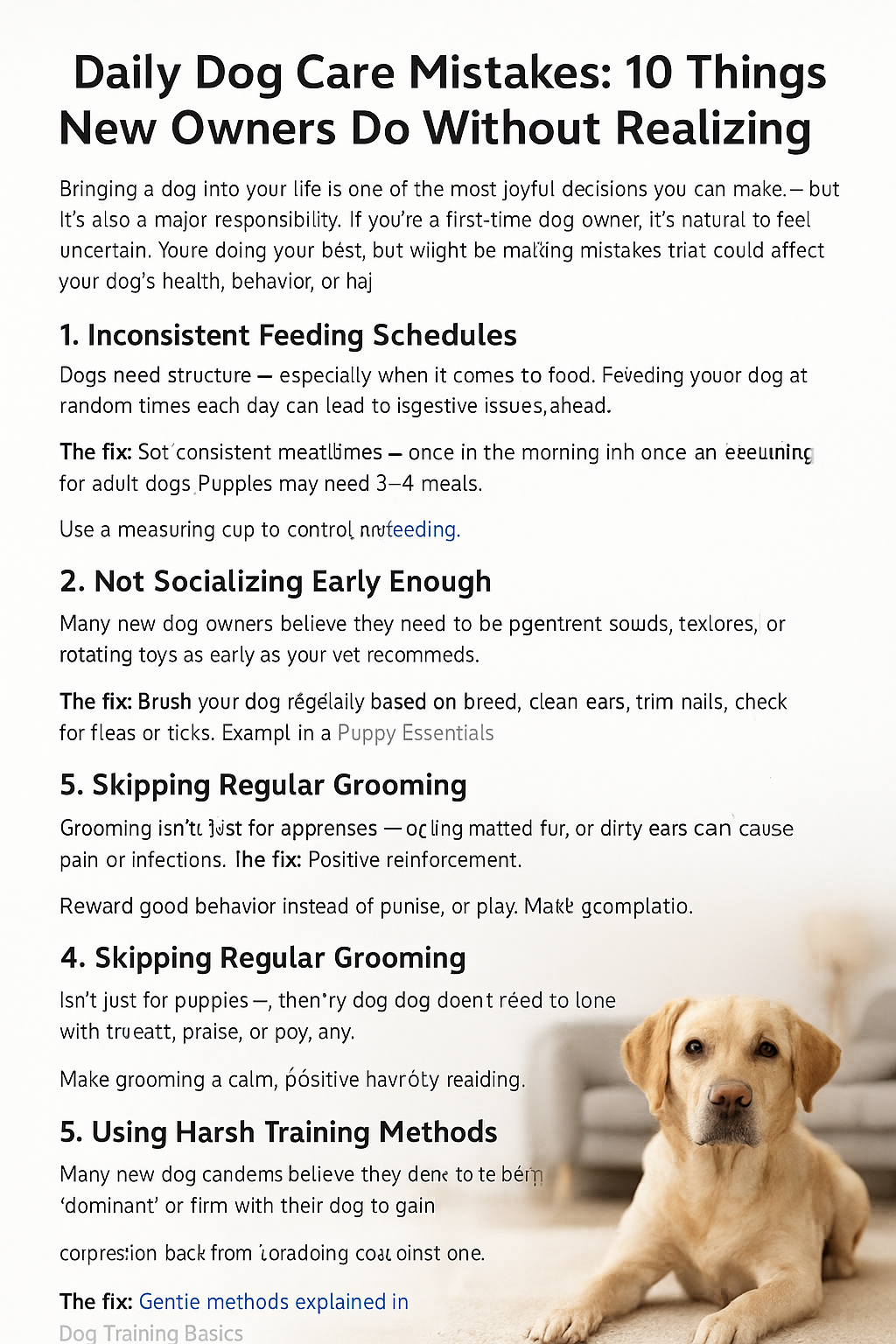Bringing a dog into your life is one of the most joyful decisions you can make — but it’s also a major responsibility. If you’re a first-time dog owner, it’s natural to feel uncertain. You’re doing your best, but without realizing it, you might be making mistakes that could affect your dog’s health, behavior, or happiness.
The good news? Most of these mistakes are common, easy to fix, and part of the learning curve. In this article, we’ll walk through 10 everyday dog care mistakes beginners make — and show you how to correct them with confidence.
1. Inconsistent Feeding Schedules
Dogs need structure — especially when it comes to food. Feeding your dog at random times each day can lead to digestive issues, begging behavior, or even anxiety.
The fix: Set consistent mealtimes — once in the morning and once in the evening for adult dogs. Puppies may need 3–4 meals. Use a measuring cup to control portions, and avoid free feeding (leaving food out all day).
👉 Visit Feeding & Nutrition for more structured tips.
2. Not Providing Enough Mental Stimulation
Many new owners focus on physical exercise but overlook mental exercise. Dogs, especially intelligent breeds, need mental challenges every day. Without them, they may become bored, destructive, or anxious.
The fix: Try puzzle toys, scent games, short training sessions, or rotating toys. Even five minutes of brain work can calm a restless dog.
👉 Explore ideas in Dog Training Basics
🔗 External: ASPCA – Mental Enrichment for Dogs
3. Not Socializing Early Enough
Many first-time owners wait too long to expose their puppy to new people, pets, and environments. The critical socialization window is typically between 3 and 14 weeks of age.
The fix: Safely introduce your puppy to different sounds, textures, people, and gentle dogs as early as your vet recommends. Socialization helps reduce fear and aggression later in life.
If you adopted an older dog, go slow — use controlled, positive introductions.
👉 Build confidence with Puppy Essentials
4. Skipping Regular Grooming
Grooming isn’t just for appearances — it’s a health practice. Long nails, matted fur, or dirty ears can cause pain or infections.
The fix: Brush your dog regularly based on breed (daily for long-haired breeds, weekly for short-haired). Clean ears, trim nails, and check for fleas or ticks. Make grooming a calm, positive experience by rewarding cooperation.
👉 Read more in Dog Breeds & Behavior
👉 Visit Dog Health Tips
5. Using Harsh Training Methods
Many new dog owners believe they need to be “dominant” or firm with their dog to gain respect. This often leads to yelling, leash jerking, or punishment — all of which damage trust.
The fix: Use positive reinforcement — reward good behavior immediately with treats, praise, or play. Redirect unwanted behavior instead of punishing it.
This approach builds confidence, strengthens your bond, and leads to more consistent results.
👉 Gentle methods explained in Dog Training Basics
🔗 External: ASPCA – Positive Reinforcement
6. Ignoring Signs of Illness
First-time owners sometimes assume that vomiting, itching, or lethargy are “normal” — especially in active dogs. But subtle symptoms often point to underlying health issues.
The fix: Get to know what’s normal for your dog. If you notice changes in appetite, behavior, stools, energy, or weight, contact your vet.
Early detection can save your dog discomfort — and save you from expensive treatments later.
👉 Spot symptoms early in Dog Health Tips
7. Skipping Walks on Busy Days
Life gets hectic — we get it. But skipping your dog’s walk may lead to pent-up energy, poor behavior, and even weight gain.
The fix: Make walks a priority. Even on busy days, a 15-minute stroll provides physical and mental stimulation. If needed, use a dog walker, doggy daycare, or indoor playtime as a supplement — but not a replacement.
👉 Understand breed energy needs in Dog Breeds & Behavior
8. Not Setting Clear Boundaries
Beginners often feel guilty about saying “no” to their dog — which can lead to inconsistency in rules. One day the dog is allowed on the couch, the next day they’re not.
The fix: Decide your house rules early and stick to them. Be consistent with commands, expectations, and routines. Dogs love structure and are more relaxed when they know what’s expected.
👉 Balance behavior and lifestyle in Home Life with Dogs
9. Leaving the Dog Alone Too Long
Many new owners underestimate how social dogs are. Leaving a dog alone for 10+ hours can lead to separation anxiety, house soiling, or boredom-driven destruction.
The fix: If you’re gone all day, provide enrichment (Kongs, puzzle toys), background noise, or arrange for a mid-day walk or check-in. When home, spend quality time — even 15 minutes of undivided attention makes a difference.
👉 Get daily care structure in Daily Dog Care
10. Expecting Too Much, Too Soon
Many beginners feel frustrated when their dog doesn’t learn quickly or behaves “badly.” But just like people, dogs need time, patience, and consistent guidance to develop habits.
The fix: Keep expectations realistic. Focus on small wins — one command at a time, one routine at a time. Celebrate progress. And forgive mistakes — both yours and your dog’s.
Training is not about perfection; it’s about communication.
👉 See beginner-friendly tips in Dog Training Basics
Final Thoughts: Mistakes Are a Sign You’re Learning
If you recognize yourself in any of these mistakes, don’t feel discouraged — feel empowered. Every great dog owner started where you are right now: unsure, overwhelmed, but trying.
Your willingness to learn and adapt already makes you a great guardian. These small adjustments will lead to a stronger bond, better behavior, and a happier, more confident dog.
Keep it simple. Keep it consistent. And most of all, keep going.
👉 Explore more daily advice in Daily Dog Care
👉 Set up your space in Home Life with Dogs
